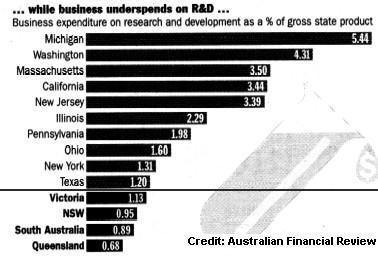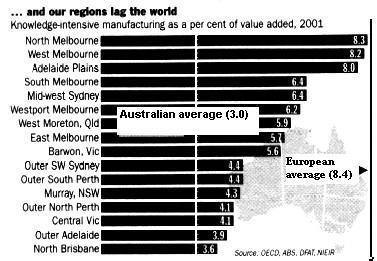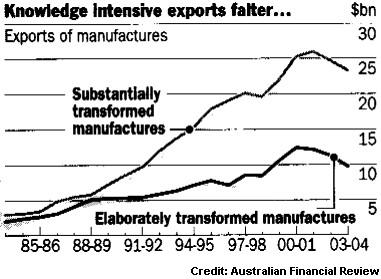|
Editorial-23 October 2004 |
|
|
SMH Heading: "Dumbing Down Under -- AFR Heading: "From Leader to Laggard in R&D". (October 22, 2004)
Two feature articles in the Australian Financial Review and The Sydney Morning Herald seem to dovetail and will have no impact on the newly elected coalition government. Why not? Well, the phraseology may have been different but its all been said before: if we don't pull our finger out and embrace the knowledge economy we'll be left with a second world economy. So what, we have the means to buy in what we need from first world nations so why bust a gut. Neither the government nor the population it governs sees that the nation's economy is either broke or moving in that direction so don't meddle with it. And there is a consensus within Cabinet reinforced by Treasury not to reform; it could/would be dangerous.
La Trobe's professor of politics, Robert Manne, writing recently in The Age point's out:
There is a fundamental paradox in the situation of contemporary middle Australia, which explains the election result. Never have suburban Australians been even remotely as wealthy as now. But never has the precariousness of their prosperity seemed to them so clear. Many hold barely sustainable mortgages over their homes. If interest rates rise even by a couple of percentage points, they will face financial turmoil.
And in those circumstances:
For fear of finding something worse.
Hillaire Belloc, More Beasts for Worse
Children
Peter Roberts' feature in the AFR spotlights Australia's business sector and it's lack of expenditure on R&D:
The key measure of private sector innovation, business expenditure on R&D, or BERD, grew at an annual average of 9.6 per cent from 1981 but began to fall in 1996-97. After four years of decline BERD began to grow again, reaching the equivalent of 0.78 per cent of gross domestic product by 2001-02. This is about the rate of middling R&D nations such as Italy and Spain and a third that of leaders such as Japan.
The dean of engineering at the University of NSW, Brendon Parker, says Australia is falling behind the world in its ability to innovate and make money out of intellectual property.
And to bring the point home Roberts provides the following charts.
|
|
But so what. The Coalition Cabinet is well aware of the figures but also fully realises the population is not fussed; does it really bear on the precariousness of their prosperity? In the short term, no. But Roberts continues:
Exports of so-called elaborately transformed manufactures (ETMs), which cover high technology but also medium technology sectors such as cars, have followed a similar pattern to innovation. After growing at an average rate of 18 per cent a year in the decade to 1995, ETM exports have stalled since 1997, and are growing at only 1.7 per cent a year.
The bottom line is a ballooning balance of trade deficit in ETMs that hit $75.4 billion in 2003-04, dwarfing primary industry exports of $62 billion.
Meanwhile Deborah Smith writing in The Sydney Morning Herald cites Queensland's Chief Scientist, Peter Andrews, "Australia will need 75,000 extra scientists in the next six years to build biotechnology and nanotechnology businesses and other knowledge-based industries if the country's international competitiveness is to be maintained, according to a recent estimate."
But such pronouncements by a Chief Scientist appointed by a state Labor Government reported in one of the nation's broadsheet's doesn't scare Robert Manne's contemporary middle Australia and the government sees no threat to its retaining power even if it believes it, which all things considered seems unlikely.
Smith also records, "...the United States has projected it will require an additional 2.2 million [additional scientists by 2010]. Mathematicians, physicists and chemists will be most in demand in Australia, with many requiring PhD level qualifications, Andrews predicts."
Currently with Europe, Canada and the U.S. providing significant inducements for our PhDs to become part of the Diaspora while our secondary schools produce decreasing numbers of students interested in pursuing tertiary studies in science or mathematics, partly because of a dearth of qualified and inspiring secondary school teachers and partly because of a perceived lack of opportunities after having completed their studies. Professor Andrews refers to this situation as "brain loss" to differentiate it from the brain drain.
In the run up to the general election just past the Labor Party gave indications that it had at least taken hold of the nettle, even if somewhat gingerly, and their federal leader, Mark Latham, has indicated that he will retain that plank of the Labor platform. But what the science and tertiary education sectors require is formation of a unified front with adequate resources in order to place convincing arguments before the opposition political parties, the private sector and the general public. Unless that is done the mindset of those currently governing will remain disinterested and unalterable.
Alex Reisner
The Funneled Web



